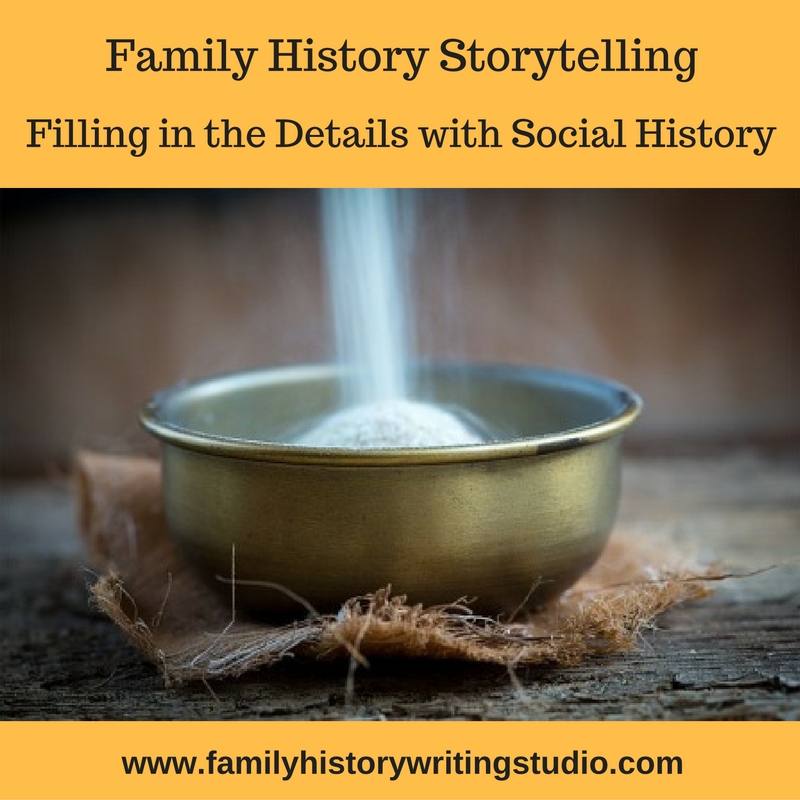When you write a family history story, you rely heavily on social history to fill in the descriptions and details of your ancestor’s life. Most likely the details we are talking about won’t be found in your genealogy research. We have to look outside of our genealogy research for these details. We have to turn our attention to social history along with the world, regional and local history of the day.
In our previous post, we began a discussion about social history and its importance in telling our family history stories, Writing a Family History When You Don’t Have All the Facts. This week let’s dig a little deeper into this subject and discuss the variety of topics that make up social history and where to find these social histories.
For Example
You have a marriage certificate, which gives you a lot of lovely facts about your great grandmother’s wedding. However, it doesn’t tell us anything about the ceremony itself. Social history can do that. History and social history studies can tell us what the church looked like, the wedding customs of the day, her dress, his attire, the religious ceremony and even the weather for the day.
Social history along with the world, regional and local history is a great tool for reconstructing your ancestor’s entire world.
Another Example
Suppose you don’t have a picture of your ancestor. You know he was a peasant farmer in the mid-west United States during 1850. Based on this information and by doing some social history research into farmers in that area, at that time, you can determine, the style of dress, hairstyles, facial hair. Look at his culture, religion, which also might add some insights into his appearance. Based on your social history research you can then surmise a brief description of his appearance. You know the expression a little goes a long way. In this case, it definitely applies. Give the reader just enough and let their imaginations fill in the rest.
Here is a list of some of the social history factors you can research when building your ancestor’s world.
| Architecture | Geography | Time and Season |
| Dating and Marriage | Old Age and Death | Family |
| Education | Occupation | Economy |
| Childraising | Health and Medicine | Technology |
| Cuisine | Fashion | Entertainment |
| Ethnicity | Language | Social Ranking |
| Law and Society | Military and War | Migration |
| Politics | Religion | Architecture |
Where to Find Social History Information
Social histories are found in a variety of places. And just like your genealogy research don’t limit yourself to online resources only.
Books Stores – Online stories and brick and mortar stores, particularly those second-hand bookstores will often offer books on local histories and custom of the time.
Libraries – Online libraries, local and regional libraries, college and university libraries all great places to look for social histories.
Local Archives and Museums – Connect with the local archives and museums in the area your ancestors lived. They often have books written by local authors that have never made it to the internet or a bookstore including letters, memoirs and diaries of locals.
Local Historians – Local historians are well read on the local history and social history of the area. Ask your local archives or museum for a meeting with a local historian.
Social Historians – There are social historian societies, reach out to them to find a social historian knowledgeable on the particular subject you are researching.
Living with the Locals – Immerse yourself in the hometown of your ancestors. Learn from the locals, visit the local tourist organizations, take a walking tour.
Newspapers – Newspapers are an incredible social history resource. They provide not only local politics and events but local businesses, gossip, family events, marriages, deaths alongside the world and regional events.
If you would like to learn more, we discuss social history in detail in Authentic Ancestors, Workbook #2. Learn to use social history to bring your ancestor and their world to life on the page.
Also, check out our Social History Resources page, it contains links to many online websites that can help you with the details you require to add description and detail to your stories. Make sure you bookmark it we are always adding more links.
